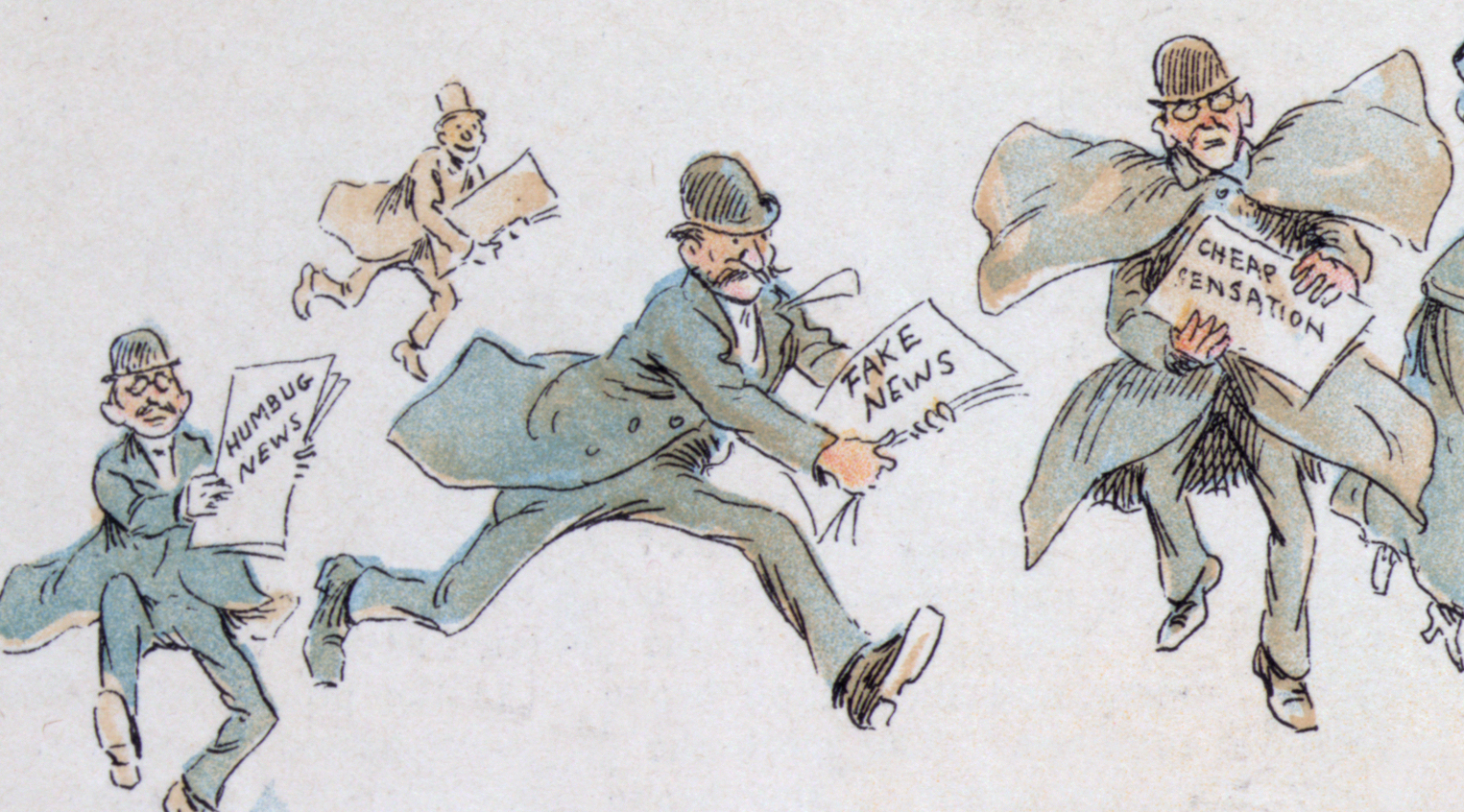Published Jul 30, 2025 | 5:28 PM ⚊ Updated Jul 30, 2025 | 5:28 PM

A man with 'fake news' rushing to the printing press. An 1894 illustration by Frederick Burr Opper. (Wikimedia Commons)
Synopsis: As Karnataka debates an anti-fake news law, the real solution may lie not in regulation, but in equipping students with critical digital literacy. While it is imperative to employ every possible approach to tackle these challenges effectively, sensitising children through early, sustained educational interventions may be the most foundational response.
The Karnataka government’s proposal to introduce an anti-fake news Bill in the upcoming monsoon session has stirred significant public debate. While the government’s concern over misinformation is understandable, such legislative interventions often raise uncomfortable
questions about censorship and state overreach. But this moment also presents an opportunity to ask: Is regulation our only recourse against the flood of fake news? Perhaps not. A more constructive—and less contentious—path lies in education.
When a single forwarded video can spark nationwide chaos before the truth emerges, our schools can rise as the first line of defense. By making classrooms hubs of digital discernment and civic responsibility, we can equip the next generation to question, verify, and challenge misinformation at its roots. Integrating critical digital literacy into everyday education is not just a desirable reform; it is a democratic necessity.
Social media platforms have taken token steps to curb misinformation, but these efforts fall short. Their underlying business models are designed to maximise engagement through clicks, shares, and comments at the expense of accuracy. Sensational and misleading content
travels faster than the truth.
Fact-checking websites try to stem the flow, but misinformation often spreads too fast for labels to make a difference. What’s urgently needed is a way to interrupt its viral momentum, and education must be part of the solution.
Initiatives led by NGOs in collaboration with schools or local stakeholders have shown that early interventions in digital literacy can empower students to become critical consumers of information. Though localised and small in scale, these efforts reflect a growing recognition
of the need to embed media literacy skills in formal education to equip young citizens with the tools to question, verify, and act responsibly in a complex information ecosystem.
Today’s misinformation is increasingly tied to everyday issues, from health scares and communal narratives to education reforms and environmental news. In a climate where content is consumed rapidly and shared impulsively, equipping citizens with the ability to
verify information is more urgent than ever. This is not merely a matter of technology regulation or platform accountability, but fundamentally a question of civic preparedness and educational relevance.
The ability to verify information should be taught early, starting in school. In a world increasingly shaped by algorithms and echo chambers, this is a fundamental civic skill. The post-pandemic surge in screentime among children and adolescents makes it critical to include media literacy in formal education. Just as students learn crafts or physical training, they must also be taught to identify and critically assess dubious social media content.
Workshops on social media literacy and updated moral science classes can have wider ripple effects. Children influence family behaviour, and informed students can help foster healthier media habits at home. In contrast, misinformation may become normalised within homes
without formal interventions, amplifying its societal impact.
Early sensitisation, beginning in primary school, is both appropriate and necessary given the young age at which children now access smartphones and the internet. Some non-governmental organisations, such as Kolkata-based DPML Learning Foundation, which
works with students on fact-checking and digital awareness, have partnered with civil society groups to promote information literacy among schoolchildren.
While such efforts are commendable, the primary responsibility lies with schools and colleges. Educational institutions must go beyond prescribed syllabi to foster the holistic development of future citizens. Critical thinking, civic consciousness, and responsible digital engagement must become foundational educational goals. Building the capacity to recognise and resist misinformation is key to nurturing an ethically grounded and socially responsible generation.
These efforts must be institutionalised across educational boards to ensure scale, consistency, and sustained impact. Embedding digital literacy and misinformation awareness into moral science or social studies curricula, or offering them as standalone modules, would establish a uniform foundation of critical skills nationwide. This transformation would also create opportunities for teacher training and employment through the development of a new cadre of specialised educators.
The Kerala government has taken encouraging steps by incorporating fact-check modules into information and communication technology textbooks for select grades. If we are serious about building societal resilience against fake news and disinformation, such a structural shift in education policy is imperative across the country.
As technologies like generative AI evolve, the spread of misinformation is accelerating faster than existing countermeasures can respond. While it is imperative to employ every possible approach to tackle these challenges effectively, sensitizing children through early, sustained
educational interventions may be the most foundational response. Teaching young minds to navigate and critically assess information not only prepares them to combat misinformation but also cultivates a well-informed and ethically grounded society for the future.
(The authors are Assistant Professors at the Indian Institute of Management, Kashipur. Views expressed are personal. Edited by Majnu Babu).

